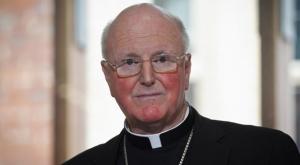When Christians think about Islam and the Muslim world one of the most common issues on their mind is the question of freedom of religion. In the popular mind the United States, and by extension Christianity, allows each person to freely choose and practice his or her own religious faith. Islam, by contrast, is believed to constrain freedom of religion because it both limits the freedom of non-Muslims in Muslim lands and outlaws conversion from Islam to other religions. This seem straight forward, but perhaps we need to get some perspective.
The Christian Bible pretty clearly teaches that all humans possess the freedom to choose which God they will worship. And because they possess that freedom they are encouraged to use it to make the right choice. This means in the Old Testament that humans are taught to choose the living creator God, Yahweh, and to reject idolatry in every form. In the New Testament this means choosing to follow Jesus Christ (who is the true living God) and rejecting both idolatry and every lesser spiritual power. What makes the New Testament context unique is that those who are choosing to follow Jesus Christ must also reject the civil religion of the Roman Empire because that entails worship of a lesser god. But, as Paul argues, Rome should allow this since Christians can both follow Christ and be loyal citizens of Rome. Unfortunately a number of Roman emperors disagreed. They didn’t believe that anyone could both be a loyal citizen of Rome and reject participation in the Roman civil religious practices.
Did things change when Rome became a Christian empire? Yes and no. Roman governments had always been worried about having their citizens engaged in religious cults that endangered the empire. They had not particularly cared about whether those cults endangered the souls of their followers. The Christian empire of Constantine and his successors was both worried about political disloyalty and felt responsible for the souls of it citizens. Under the burden of these responsibilities (for empire and human souls) it denied freedom of religion. Instead the Christian government tried to insure that people made the right choices. It didn’t deny the Bible’s teaching that people were free to choose. It simply believed that it was responsible to constrain those choices for the good of the empire and individual souls. And the Christian church agreed, and indeed encouraged the imperial government to keep people from making the wrong choice and in many cases to force them (if they were not Christian) to make the right choice. In Jesus’ parable of the wedding banquet the king says “compel them to come in” and Christians interpreted this to mean that Christian kings could compel non-Christians to enter the faith and thus save their souls.
This all began to change around the time of the Reformation. A new idea was abroad in Christian Europe, the idea that one’s religion was not valid unless it represented a sincere, informed, personal choice. In other words the government couldn’t insure that you were going to heaven just by making sure you were baptized and went to mass. It needed to be your free choice as well. In this new environment government controls of religious faith began to seem like a bad idea, even apart from the vicious destruction of the ongoing religious wars. Moreover, some people began to think that as long as the church had a hand in government it wasn’t going to let people freely choose their religion, since it might lose power. The emphasis in Christianity shifted from governments constraining religious freedom and even forcing religious conversion to churches and individuals becoming responsible to persuade people to make the right religious choice. Evangelism became the tool of choice for guiding people toward correct religious decisions, not law.
The three movements; to get the government out of the business of encouraging people to follow the right religion, to get the church out of the government, and to allow free religious expression for the sake of persuading others really came together in the United States and France. Elsewhere European governments agreed that most people should have freedom of religion, but still believed that the government should at least guide people to make the right choices. This is true even up to today. Governments in many European countries, including Austria (where I lived) have government ministries that both outlaw some religions from functioning publicly and try to advise their citizens on which religions are good. In other words they allow freedom of religion but not freedom of religious expression, which are too separate things.
We can see that there is no consensus among Christians historically and worldwide that American style religious freedom is particularly Christian, The question that most Christians and Christian governments ask just about the right to freedom of religion but also about the responsibility of the government to do what is good for the nation, encourage morality, and try to insure that people make the right religious choice and thus go to heaven. They do not necessarily accept the modern Western view the valid religious choices must be individually, autonomously, and freely made. Many, if not most governments in the world whether Christian, Muslim, Buddhist, Hindu, or something else believe that the government has at least some responsibility for encouraging good religion and protecting people from bad religion.
What about Islam; the religion most commonly accused of being against freedom of religion? Well traditionally Islamic teaching was almost exactly that of the historic Roman Catholic church; except that Islam was far more liberal. The Catholic and Orthodox churches did not wish to allow any religion, or any even non-Catholic or non-Orthodox churches in Christian lands. Traditional Islam taught that at the least all monotheists should be allowed freedom of religion. However, because Islam was regarded as the most true faith Islamic law forbade these non-Muslim religions from trying to convert Muslims and constrained their freedom in other ways to prevent them from having more prestige or public presence than Islam. And many Muslim governments today follow the same rational. Thus they constrain the freedoms of both Muslim and non-Muslim religious groups in what they regard as the public interest. The allow freedom of religion, but not freedom of religious expression.
Today there are new voices in the Muslim world who argue that in fact God intends for all religious choices to be free, that only free choices are valid, and that without free religious expression all choices are de facto constrained. Thus they argue that long-standing Muslim legal prohibitions against Christian evangelism and Muslim conversion should be removed. And these voices are gaining some credence in the Muslim world, especially where it are large numbers of Muslims from minority sects that are being persecuted. In other words the Muslim understanding of what it means to be fully human in relation to God is changing.
A final point: if we are to argue on behalf of the human right to religious freedom we need to recognize that our argument depends on a certain understanding of both what it means to be fully human in relation to God, and what that means in terms of the responsibility of governments, educational institutions, and even parents and family. Because what modern Christians believe is not what Christians have always believed we will have to offer genuine new theological arguments not mere references to tradition. And we need to recognize that we all live in larger social settings. We may desire to be free, but in the end none of us is autonomous. Our freedom, and the freedom of others, will always exist within the sense of responsibility we have for one another, both temporal and eternal. The exercise of that responsibility is not de facto an attack on freedom nor is the laisse faire allowing of religious fraud an upholding of religious liberty. Caveat emptor in a wide open religious market place isn’t necessarily any more ethical than it is in the market for insurance, making the necessary choices difficult even in country like the United States.











